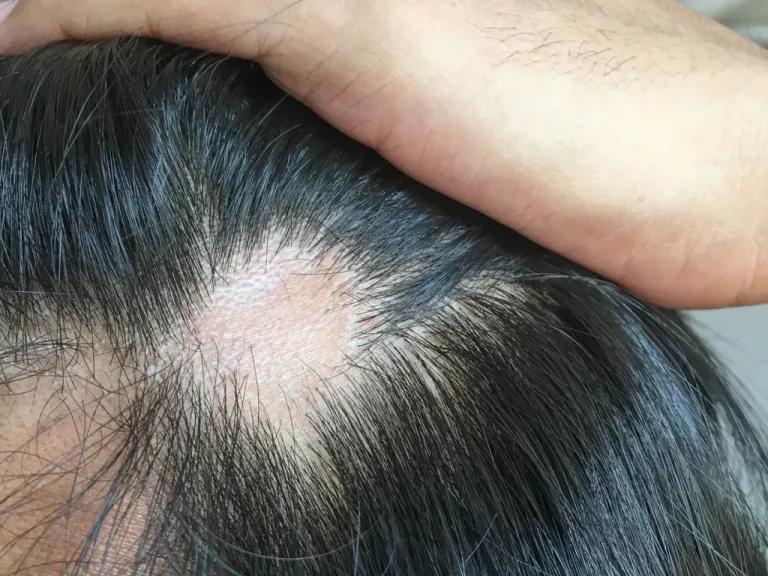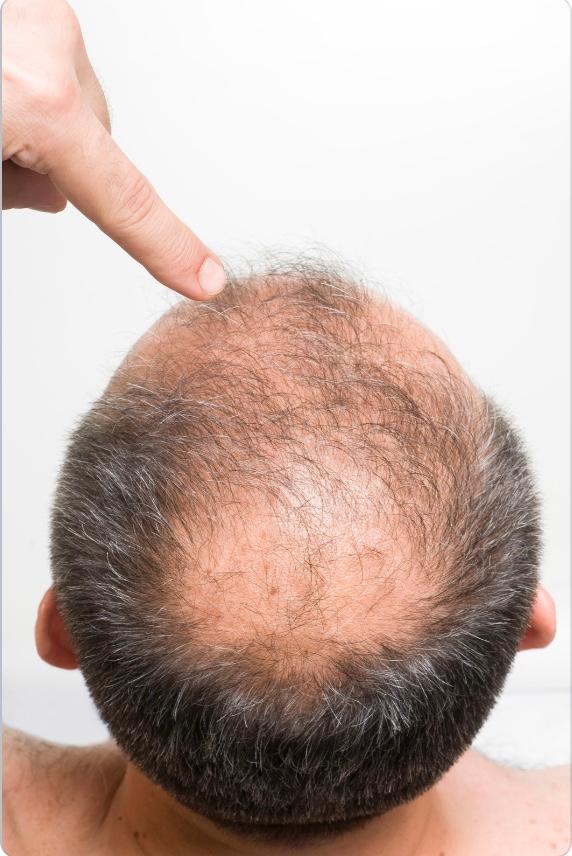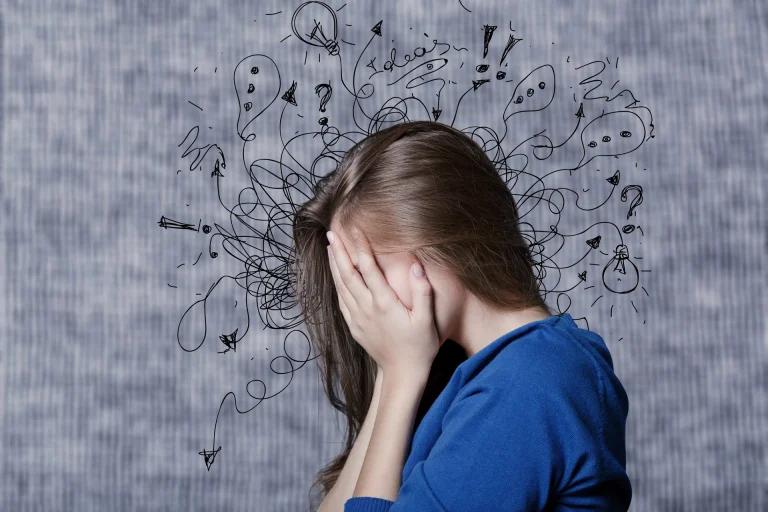
Stress can affect us all at some point in our lives. Finances, bereavement, divorce or ill health can increase people’s stress levels and other mental health issues. We sometimes feel like we carry the weight of the world on our shoulders. It is completely normal to be feeling stressed. However, our body can respond to stress in many different ways such as insomnia, low energy, change in appetite or even hair loss. This guide will look at stress-induced hair loss, also known as telogen effluvium and ways to help you bounce back.
⭕ The hair growth cycle of healthy hair
The hair on your body undergoes a continuous growth cycle, which has four stages:
Stage 1: Growth phase (anagen phase). A hair follicle (the holes in your skin that hair grows out of) produces new hair. This strand of hair grows thicker and longer until it reaches its full length
Stage 2: Regression phase (catagen phase). The strand of hair detaches from the follicle. It stays attached to the skin, but it stops growing
Stage 3: Resting phase (telogen phase). A new strand of hair starts to grow from the follicle beneath the older hair that’s just detached from it
Stage 4: Shedding phase (exogen phase). The old hair breaks away from the skin and falls out. The new hair beneath it begins to emerge, and we’re back to stage 1
So you can see that normal hair loss (stage 4), called shedding, doesn’t make you go bald, as new hair emerges from the follicle and grows to take its place.
📝 What is telogen effluvium?
It is normal to shed approximately 80-100 hairs from our scalp daily as part of our hair cycle but this can vary depending on washing and brushing routines.
Hair regrows automatically so that the total number of hairs on our head remains constant. Telogen effluvium occurs when there is a marked increase in the number of hairs shed each day.
An increased proportion of hairs shift from the growing phase (anagen) to the shedding phase (telegen). Normally only 10% of the scalp is in the telogen phase, but in telogen effluvium, this increases to 30% or more. Managing your stress could be the key to returning to a healthy rate of hair growth.
Telogen effluvium is a temporary type of hair loss, but chronic stress can prolong hair shedding and even cause permanent loss by damaging follicles.
Another type of hair loss triggered by stress is alopecia areata (an autoimmune disease that can result in patchy hair loss) and trichotillomania (hair-pulling disorder).
📝 What causes telogen effluvium?
This usually happens suddenly and is a reaction type of hair fall, meaning it is triggered by an underlying cause. It occurs approximately three months after a trigger such as:
- A stressful event causing emotional stress
- Long-term conditions or illness e.g. thyroid imbalance
- After childbirth
- Medications
- Skin problems
😟 How can stress cause hair loss?
Stress causes the body to release high amounts of the stress hormone cortisol. It’s what gives us our fight or flight response, which is why it’s common to feel on edge when you’re stressed. Unfortunately, this process causes a hormonal imbalance that temporarily turns off your hair follicles by your immune system and pushes them into a ‘resting phase’. This resting phase happens while your body deals with whatever threat it’s detecting. In this case, stress.
📝 How do I know it is telogen effluvium?
A doctor or dermatologist is the best person to diagnose telogen effluvium based on appearance, pattern or hair fall, your medical history and lifestyle. The usual signs are:
- Hair shedding from all over the scalp
- More hair falling when washing and combing hair
- Overall hair density decreased
- Reduced hair volume
💉 Treatment of telogen effluvium
Stress-related hair loss has multiple treatment options available to get you back on track. The first place to start is a visit to your doctor, as they can refer you to a specialist therapist. If you’re not prepared to go down this route, then the other most effective way to cope with stress is to open up. Speaking to friends or family can help. When we find ourselves in a stressful situation we tend to think and act irrationally. Speaking to someone less involved is sometimes the better way to discuss problems.
Identify the stress trigger
Working out the trigger or stressor of your cause of hair loss is very important as it gives you a starting point. Has a work situation triggered your stress? A stressful relationship? A financial struggle? A loved one being ill?
Move more
Exercise isn’t just beneficial for your physical health, it can improve your stress levels and mental well-being too. Science has shown that regular exercise can help with stress, anxiety and depression, and it may be as effective as antidepressant medications for mild to moderate mental health disorders (but with fewer side effects!). It’s thought that exercise helps by:
- Changing your brain chemistry – exercise can make your brain release more of various brain chemicals that improve your mood, like endorphins and serotonin
- Improving the flow of blood to your brain – which increases how much oxygen your brain receives, and in turn, helps to improve your mood and thinking
- Reducing stress – exercise is thought to dampen activity in regions of your brain that are activated by stress, like your amygdala
- Helping you sleep better – exercise can help with any sleep problems you have, which also has benefits for your mental health
- Increasing your energy levels – which are often reduced if your mental health is suffering
- Giving you a focus and a sense of achievement – exercise can distract you from your problems and help provide you with goals and a sense of achievement. It can also improve your self-esteem
- Helping you socialise – some types of exercise will get you interacting with other people, which can help with your mental wellbeing too
Diet and nutrition
Your hair needs a range of nutrients to grow, and not getting enough of these nutrients can cause your hair to thin and even fall out. Eating a varied diet rich in a wide range of nutrients will contribute to hair health and avoid hair loss due to nutritional deficiencies.
Hair is mostly made from a substance called keratin, which is a type of protein that gives your hair strands their structure. You need to get enough protein in your diet for your body to make sufficient keratin to keep your hair healthy and growing. A protein deficiency can cause your hair to fall out.
Biotin, one of the B vitamins, is also used by your body to create keratin. Not getting enough biotin in your diet can lead to problems with thinning hair.
Iron deficiency is the most common dietary deficiency, and a lack of iron can also contribute to hair loss. Taking supplements like vitamin D, iron, and zinc are useful if deficient.
Stress management techniques
Incorporating journalling into your life is proven to reduce anxiety and stress levels. Many people find it cathartic as it can release your emotion onto the page, declutter the mind and offload thoughts without anyone’s opinions coming back at you is powerful. Also adding a gratitude journal to your daily routine encourages you to focus on the positive aspects of your life. Regularly noting down what you are thankful for contributes to increased overall wellbeing and mental health.
Medication
Hair loss treatment is available over-the-counter (OTC) that you apply to your scalp, such as minoxidil to promote hair growth.
📝 Conclusion
Losing hair due to telogen effluvium can be stressful on top of all the worries that have caused this condition to arise, and you may fear that you’ll lose all of your hair. However, the outlook is good as telogen effluvium is normally a temporary phase. It usually goes away three to six months after you start noticing your hair loss. Work with your healthcare provider to take steps to promote new hair growth.
Sources
- How stress causes hair loss – National Institutes of Health (NIH)
- Telogen Effluvium: Symptoms, Causes, Treatment & Regrowth
- Telogen Effluvium – Alopecia UK
NowPatient has taken all reasonable steps to ensure that all material is factually accurate, complete, and current. However, the knowledge and experience of a qualified healthcare professional should always be sought after instead of using the information on this page. Before taking any drug, you should always speak to your doctor or another qualified healthcare provider.
The information provided here about medications is subject to change and is not meant to include all uses, precautions, warnings, directions, drug interactions, allergic reactions, or negative effects. The absence of warnings or other information for a particular medication does not imply that the medication or medication combination is appropriate for all patients or for all possible purposes.









